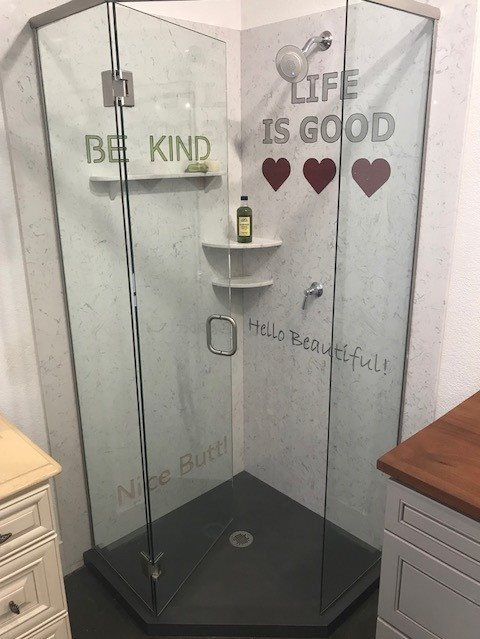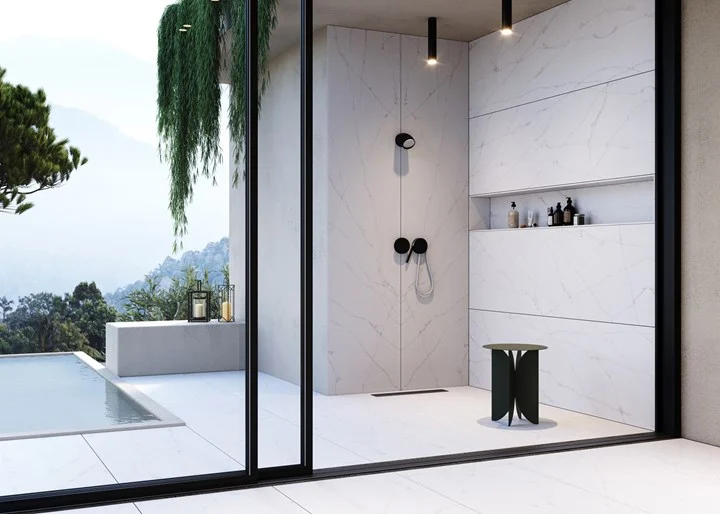When designing your dream shower, choosing the right surface material isn’t just about aesthetics – it’s about long-term durability and maintenance. This guide compares how porcelain, quartz, and granite handle common shower challenges like mold, constant water exposure, and soap scum buildup.

Best Materials for Mold and Mildew Resistance
Among the three popular options, porcelain takes the lead in mold and mildew resistance. Here’s why:
Porcelain’s superior resistance comes from its manufacturing process. Fired at extremely high temperatures (up to 2,500°F), porcelain becomes nearly non-porous, giving mold and mildew virtually nowhere to grow. Its glass-like surface naturally repels water, making it exceptionally difficult for unwanted organisms to take hold.
Quartz follows closely behind porcelain in mold resistance. As an engineered stone composed of roughly 93% natural quartz and 7% resins and pigments, quartz surfaces are non-porous by design. The resin binding creates an impermeable surface that effectively prevents mold growth when properly maintained.
Granite, while beautiful, requires more attention to prevent mold growth. As a natural stone, granite has microscopic pores that can harbor moisture and, potentially, mold spores. However, with proper sealing and maintenance, granite can still be an excellent shower surface choice.
Handling Constant Water Exposure
Daily shower use puts surfaces under significant stress. Here’s how each material performs under constant water exposure:
Porcelain excels in wet environments, which is why it’s been the go-to choice for bathrooms for centuries. Its extremely low water absorption rate (typically less than 0.5%) means it can handle constant water exposure without any degradation in performance or appearance.
Quartz maintains its integrity well under regular water exposure. The resin components that bind the natural quartz particles create a waterproof barrier that prevents water from penetrating the surface. However, prolonged exposure to direct sunlight combined with water can potentially cause some discoloration over many years.
Granite requires more attention in wet environments. While properly sealed granite can handle water exposure well, the sealant needs regular reapplication (typically annually) to maintain its water-resistant properties. Without proper maintenance, water can penetrate the stone’s pores, potentially leading to staining or degradation over time.
Managing Soap Scum Buildup
Soap scum is an inevitable challenge in any shower. Here’s how these materials stack up:
Porcelain offers the easiest maintenance when it comes to soap scum. Its non-porous, smooth surface makes it difficult for soap scum to adhere strongly. Regular cleaning with standard bathroom cleaners easily removes any buildup without damaging the surface.
Quartz provides similar benefits to porcelain regarding soap scum resistance. Its non-porous surface prevents soap scum from penetrating the material, making cleanup relatively straightforward. However, avoid using harsh, abrasive cleaners as they can potentially damage the resin binding over time.
Granite poses the biggest challenge with soap scum management. Its slightly textured surface and natural pores can trap soap residue, making thorough cleaning more important and potentially more time-consuming. Using pH-neutral cleaners is crucial to protect the stone’s sealant while removing soap scum.
Maintenance Tips for All Surfaces
Regardless of your chosen material, following these maintenance practices will extend the life of your shower surfaces:
- Wipe surfaces dry after each use to prevent water spots and mineral buildup
- Use a squeegee or microfiber cloth for daily maintenance
- Clean weekly with appropriate surface-specific cleaners
- Ensure proper ventilation to reduce moisture accumulation
- Address any signs of deteriorating sealant or grout promptly
Final Verdict
While all three materials can work well in shower applications, porcelain emerges as the most practical choice for most homeowners. It offers superior mold resistance, excellent water handling, and the easiest maintenance routine. Quartz provides similar benefits with added luxury appeal, while granite, though requiring more maintenance, offers unmatched natural beauty. You can see all of our current quartz color options on our website here. To see what porcelain options we have in stock checkout our live online inventory. We can also custom order materials from any brands including our personal favoriate SapienStone.
Consider your lifestyle, maintenance preferences, and budget when making your final decision. The right choice will provide years of beautiful, trouble-free service in your shower space.
